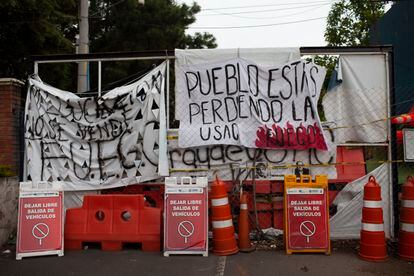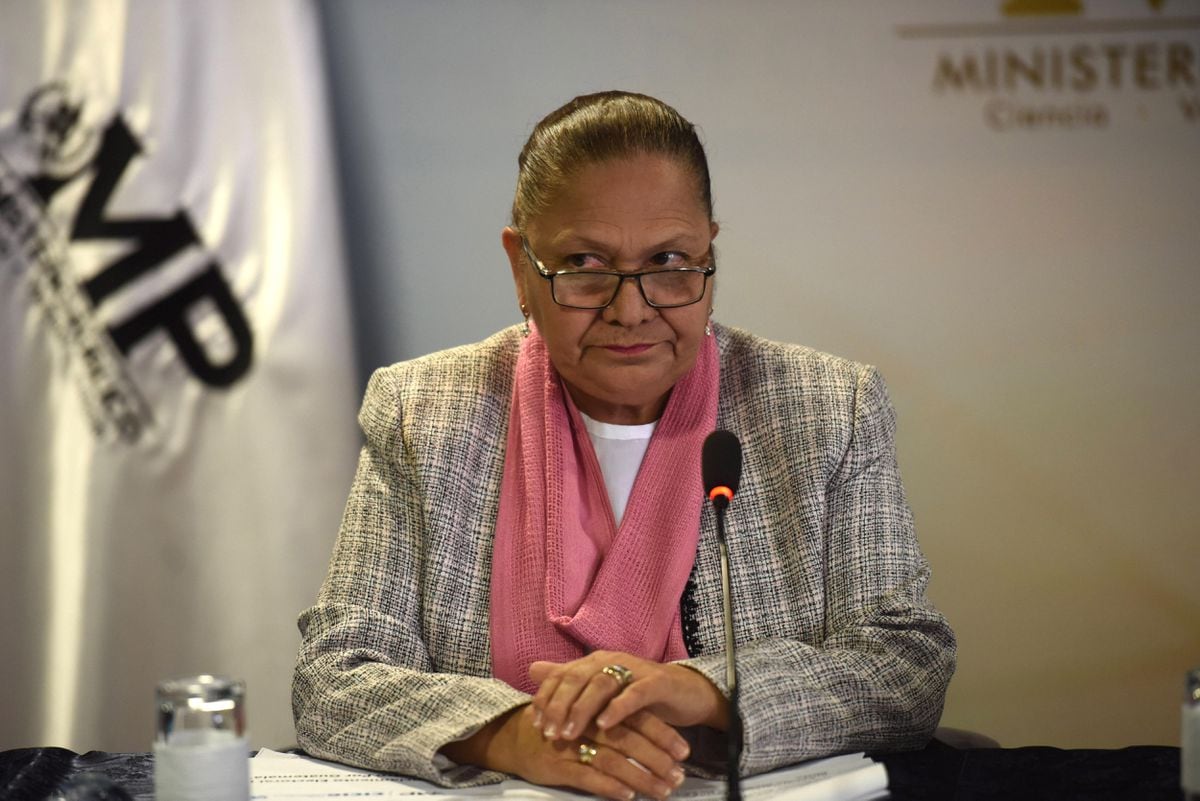The corridors of the University of San Carlos, the main one in Guatemala, are the thermometer where these days the weariness of Guatemalans towards the excesses of their political and economic elites can be measured.
The campus celebrates 100 days this Saturday since it was taken over by a group of students protesting what they consider a fraud in the election of the university authorities, but their anger goes further: they assure that the arbitrariness of the authorities of this educational center of more than 200,000 students are the reflection of a country with an uncertain future, which is gradually sinking into an abyss of impunity that fills them with despair.
“We have reached a very high crisis peak,” says Laura Aguiar, 23, a Communication Sciences student.
This young woman's face breaks down when she cites a string of recent events that outrage her: the courts sentence judges involved in the fight against corruption, many of them pushed into exile;
the institutions have fallen under the control of the president, Alejandro Giammattei, which suffocates his independence;
spaces for protest are closed, while the Executive launches a crusade against any critical voice with the threat of jail, as has happened to the respected journalist José Rubén Zamora, director of
elPeriódico
.
"It is difficult to survive in this reality that touched us," insists Aguiar.
“And it is sadder to know that the future does not look promising.
We only have resistance”, assures this young woman, while her classmates erect barricades to prevent the security forces or shock groups from entering the campus that threaten to break up her protest.
The Guatemala of today seems very far from that country that in 2015 aroused hopes in Central America, when a wave of popular indignation forced the fall of General Otto Pérez Molina.
The ex-military man was implicated in a corruption scheme known as La Línea, a gigantic structure set up at the expense of the State, which, in exchange for high payments, allowed goods to be imported, circumventing taxes.
At the head of this corrupt plot was the vice president and former candidate for Miss Guatemala Roxana Baldetti, but from the top it was directed by the president himself.
A revelation made by the Office of the Prosecutor against Corruption with the meticulous work of the International Commission against Impunity in Guatemala (CICIG), a kind of special Prosecutor's Office created in 2006 with the support of the UN.
The resignation and subsequent prosecution of Pérez Molina filled the country with hope, in what became known as the democratic spring of Guatemala, a nation that finally, after years of dealing with the corruption of economic and political power, seemed to be moving towards a system where rule of law prevailed.
Seven years after that waste of happiness, Guatemalans wonder what happened to their country, which now seems submerged in a deterioration without return.
The San Carlos University is therefore the mirror where many Guatemalans see themselves.
It is not for nothing that the cars that pass by the university sound their horns in support of the students, because this protest is felt by some as a fresh breath in the midst of the rot that the country's newspapers present every day.
Because for most Guatemalans, the forced departure of the CICIG from the country was a blow that plunged them into helplessness.
A coup orchestrated, according to the sources consulted for this report, by the powerful elites that control Guatemala.
Cristal Figueroa, 22, sociology student and student representative at the University of San Carlos. Sandra Sebastián
“The fear of uncovering corruption cases began to unite the traditional and emerging elites, who forgot their quarrels and formed blocs with diverse officials and decided on a plan: the first objective of that plan was to discredit the CICIG in order to dismantle it, which that they achieved in 2019″.
Explains Edgar Gutiérrez, former Foreign Minister and one of the most lucid analysts of Guatemala.
In order to consolidate this plan —in Guatemala they call it a “corrupt pact”—, the economic power groups took advantage of the good disposition of former president Jimmy Morales, whom the CICIG itself implicated in corruption.
Morales decided to break with the agreement that Guatemala had maintained for 12 years with the United Nations institution and ordered the departure of foreign officials from the organization,
It was then that the fall into the abyss of the country began.
"The elites began to regain control of all State institutions related to the justice system," says analyst Gutiérrez.
And so began a ruthless persecution against justice operators who participated in the crusade against corruption with the support of the CICIG.
“All of this has been done trampling on the Constitution and the rule of law,” says Gutiérrez.
The war against independent judges and prosecutors who fight corruption in Guatemala has already left a score of victims, officials who have gone into exile because of the threats against them.
Among them are Juan Francisco Sandoval, who headed the Special Prosecutor's Office Against Impunity (FECI);
former Attorney General Thelma Aldana;
the former magistrate of the Court of Appeals Claudia Escobar;
former FECI prosecutor Andrei González;
the elected magistrate of the Constitutional Court (CC) Gloria Porras or the judge Erika Aifán.
Students keep the facilities of the University of San Carlos de Guatemala under control. Sandra Sebastián
Flor Gálvez, a lawyer who worked with the CICIG, knows about exile.
Without mentioning where she is now, Gálvez explains that she worked on highly publicized corruption cases, which included the theft of money from the Ministry of Defense, in which she was linked to a son of former dictator Efraín Ríos Montt.
“We touched on structures linked to electoral financing, with high-level businessmen from the business chamber.
This generated antibodies against the CICIG”, explains Gálvez.
“We had been working in a very weak and corrupt penal system and exposing all that corruption was annoying for the Courts, magistrates and judges who wanted to maintain that
status quo .
.
When the CICIG ended, a report was left with the shortcomings of the justice system.
But everything went downhill.
Since 2019, an attack began against those of us who work at CICIG.
The threats were carried out”, he explains.
And then came persecution and exile.
A persecution that has had its peak under the protection of the Government of President Alejandro Giammattei, a politician without charisma, reserved and deeply conservative, who came to power in 2019 in the second round in an election with a tiny turnout and who receives an opinion refusal of Guatemalans, according to surveys.
For Giammattei, leaving the CICIG was a respite.
Gálvez explains why: “The CICIG was investigating him for extrajudicial executions.
He was director of the Penitentiary System in 2006. It was detected that he had extrajudicially executed inmates who were in a penitentiary called Pavón.
The president was linked to the process because he gave orders to execute several prisoners,
During his tenure, Giammattei has achieved control of the institutions, especially the justice system, and for this he has used a controversial character: the attorney general Consuelo Porras, pointed out by the prosecutors and judges sentenced to exile for being the architect of the lawsuits against him.
In May, Giammattei renewed Porras' mandate, which generated strong criticism in Guatemala and internationally: Washington had already announced that it was suspending collaboration with the Guatemalan Public Ministry due to the persecution of judges who fight corruption.
As if it were not enough for Guatemalans to have breakfast every day with the news of a judge leaving the country or a new corruption scandal, two weeks ago they were able to see live the raid on the house of José Rubén Zamora, the most respected journalist of the country, accused by the Prosecutor's Office of money laundering.
The first hearing of the case was held on Wednesday, in which Zamora reiterated his innocence and affirmed that it is a persecution of Giammattei for the publications that reveal corruption and abuse of power, made by
elPeriódico
, the newspaper he founded in 1996. The hearing took place in a suffocating room in the labyrinthine headquarters of the Guatemalan courts.
Filled with journalists, cameras and photographers, a volcanic character stood out among the crowd, who after the end of the process, addressed the television cameras to affirm that the trial against Zamora was legal and in accordance with the law.
“We do not live in a regime like that of Nicaragua, Cuba or Venezuela.
Union rights are being respected,” he said almost loudly.
It was Ricardo Méndez Ruiz, director of the Foundation against Terrorism, an extreme right-wing organization that has shown great belligerence in the trials against anti-corruption judges and prosecutors.
In Guatemala, it is surprising that this private organization participates in the processes.
Journalist José Rubén Zamora Marroquín, after his arrest on July 29, 2022. SANDRA SEBASTIÁN
"The Foundation against Terrorism is the legal arm of businessmen to carry out all these actions, because all the complaints against justice operators come from this foundation," says a source in Guatemala City who requests anonymity.
“This foundation is subject to the Public Ministry.
It was created in 2013 to support former members of the security forces who were being prosecuted in the midst of transitional justice for cases of crimes against humanity and forced disappearance," explains the source, referring to the long armed conflict that left more than 200,000 deaths in Guatemala (1960-1996).
The day of the hearing against Zamora, EL PAÍS asked Méndez Ruiz why he was participating as a plaintiff in the trial.
“Because it is my constitutional right,” he said.
—Who finances the Foundation against Terrorism?
“We finance it ourselves.
"We, who?"
—Why don't you ask José Rubén Zamora who finances his newspaper?
"I'm asking you."
“I finance it.
Sources consulted for this report affirm that the Foundation against Terrorism aims to put an end to what it considers “illegalities” committed by the CICIG, judges and prosecutors with businessmen and politicians who were investigated and convicted of acts of corruption.
The same sources point out —just as Guatemalan media have done— that money from ex-military personnel and important businessmen from the cement, sugar and finance sectors is behind this organization.
"It is a war sponsored by the elites," they say.
According to these sources, it is these powerful groups that push Guatemala into the abyss and are the ones that generate the despair that has led the group of students from the University of San Carlos to take over the campus as a way of demonstrating their fed up with the system.
Entrenched between sandbags,
Follow all the international information on
and
, or in
our weekly newsletter
.





/cloudfront-eu-central-1.images.arcpublishing.com/prisa/7ZSE2B3NHBCBXJUKMVDIJEMBHI.jpg)

/cloudfront-eu-central-1.images.arcpublishing.com/prisa/TSUEZ7K7S5HNDE7GY53532ZZ7A.jpg)
/cloudfront-eu-central-1.images.arcpublishing.com/prisa/34ZR4HH37ALPAI5BSQHC3V42QE.jpg)
